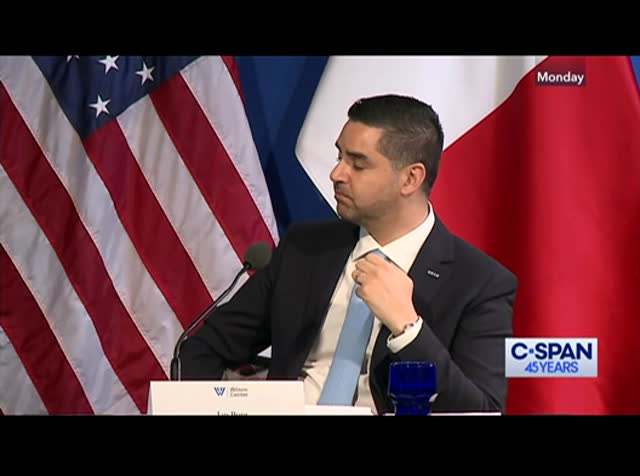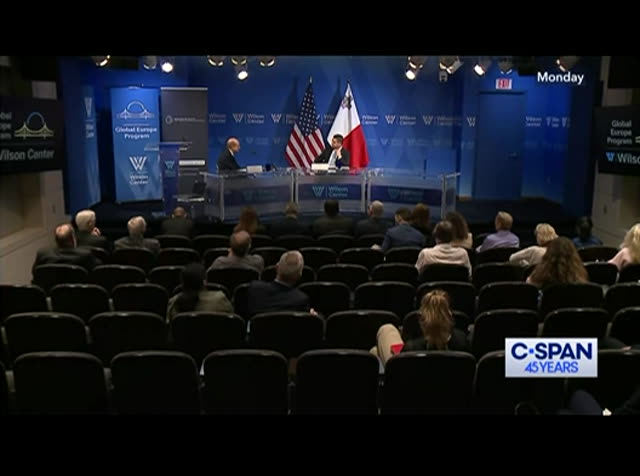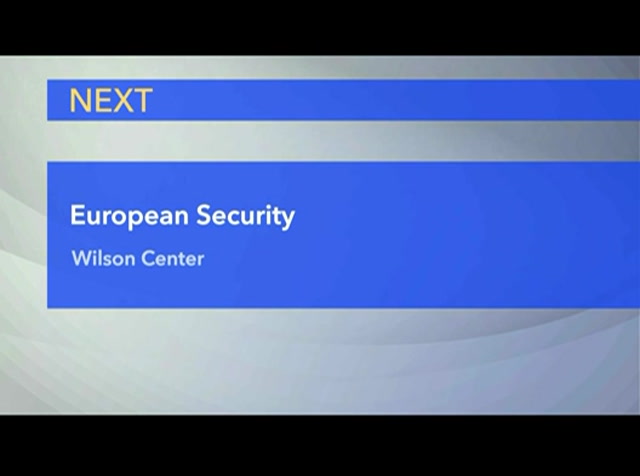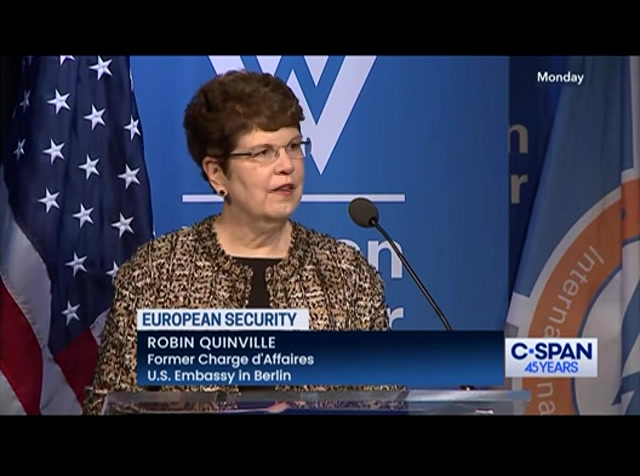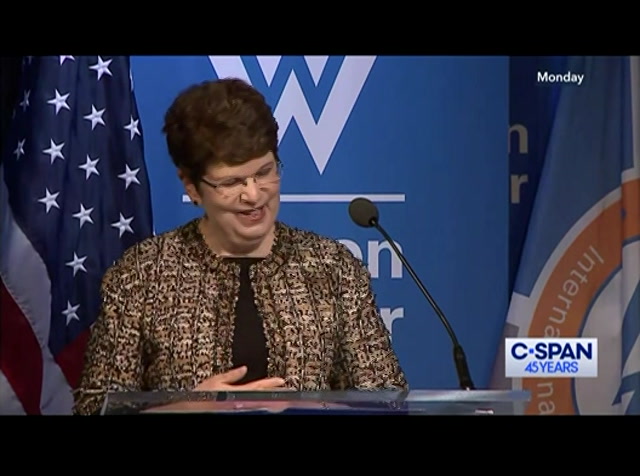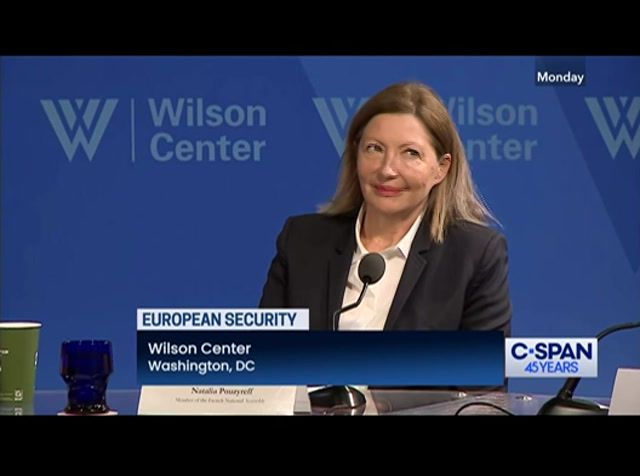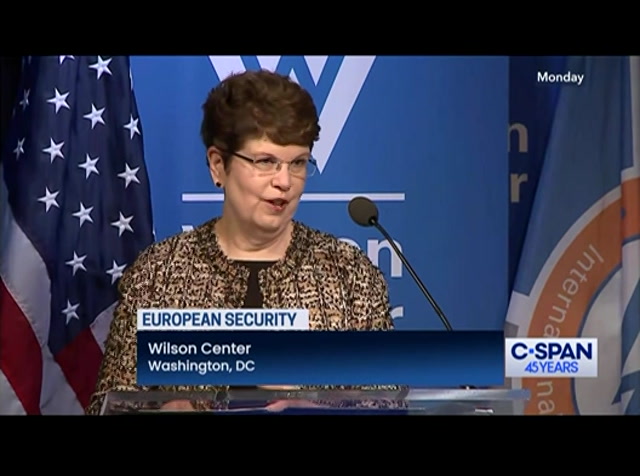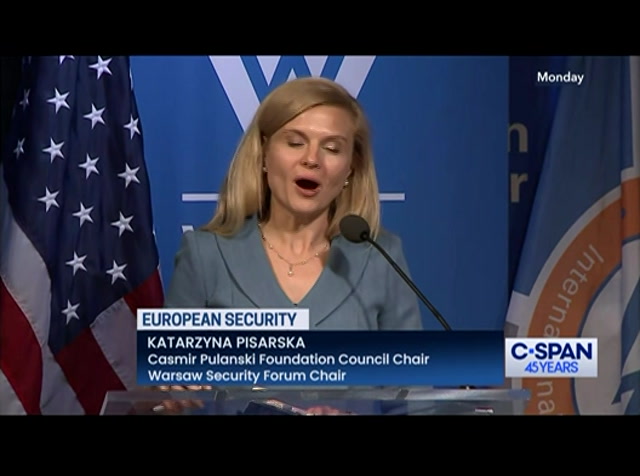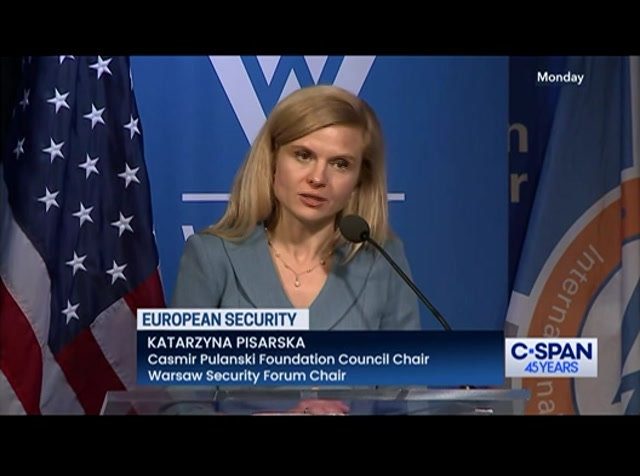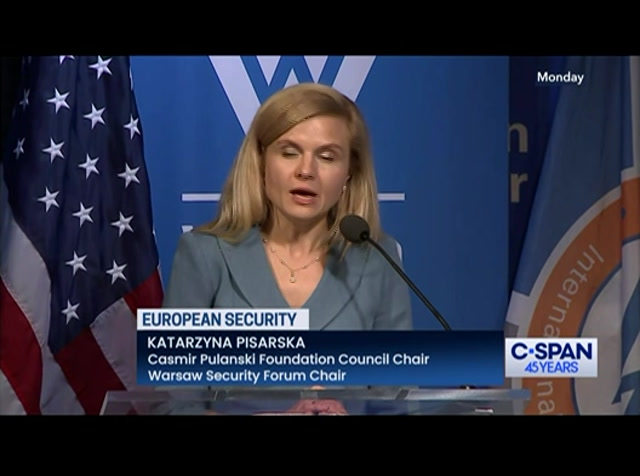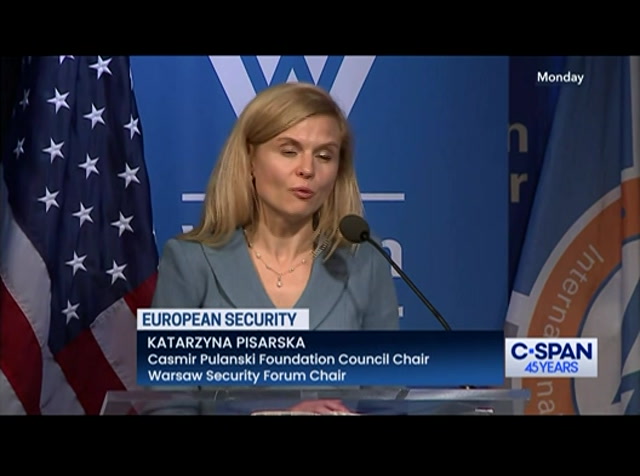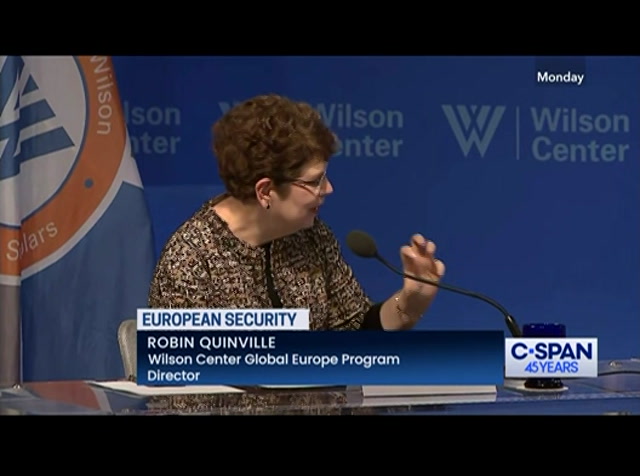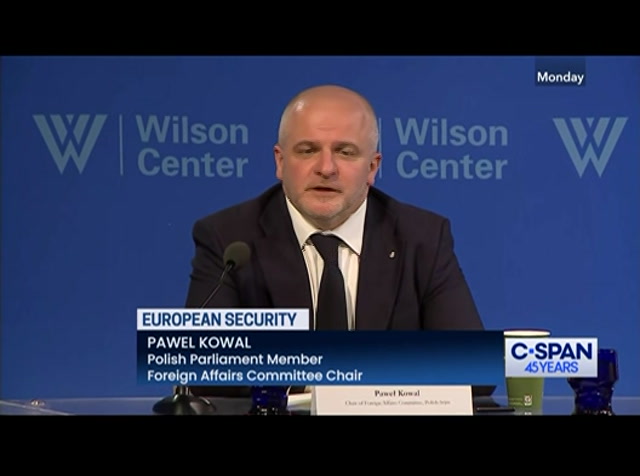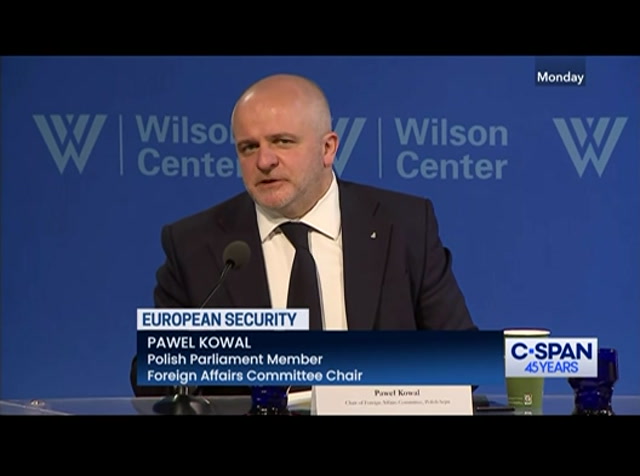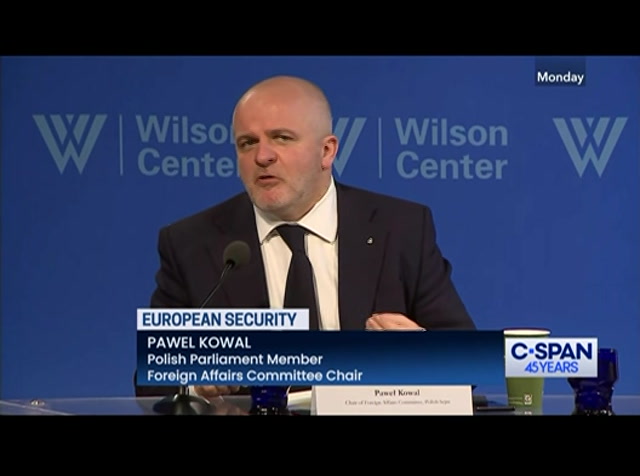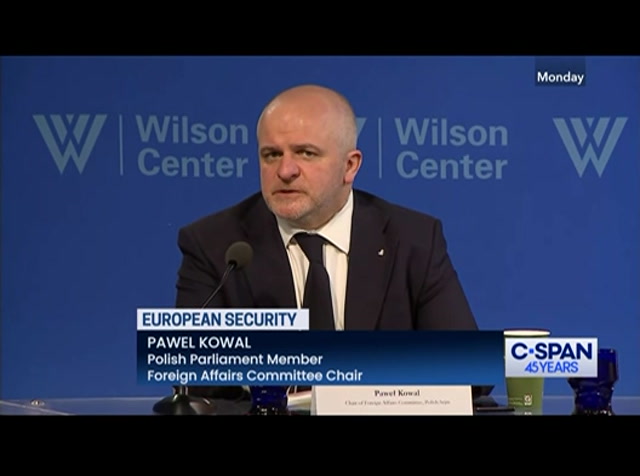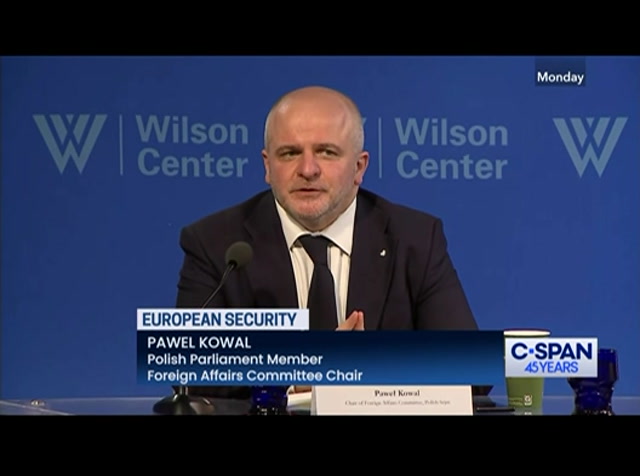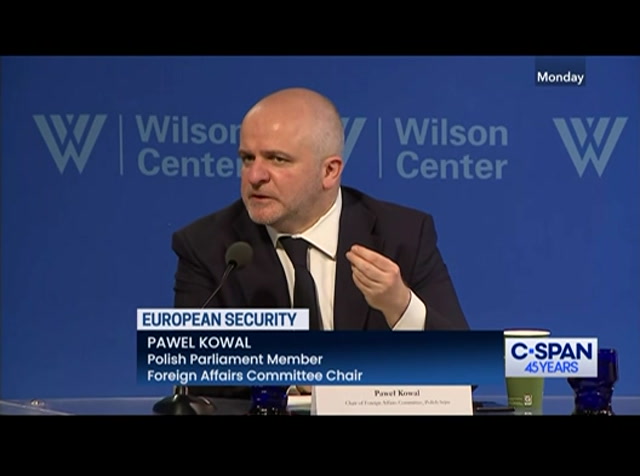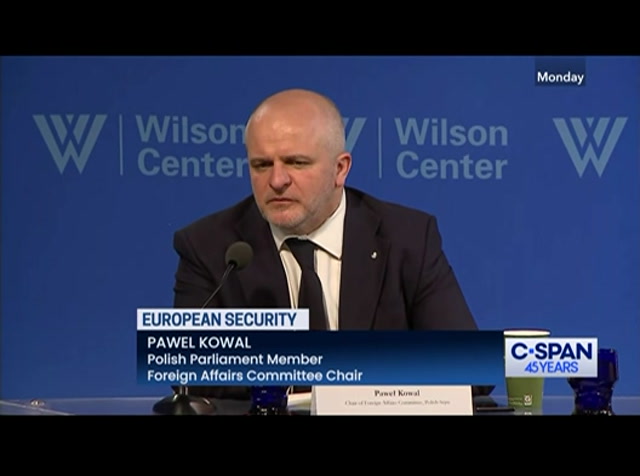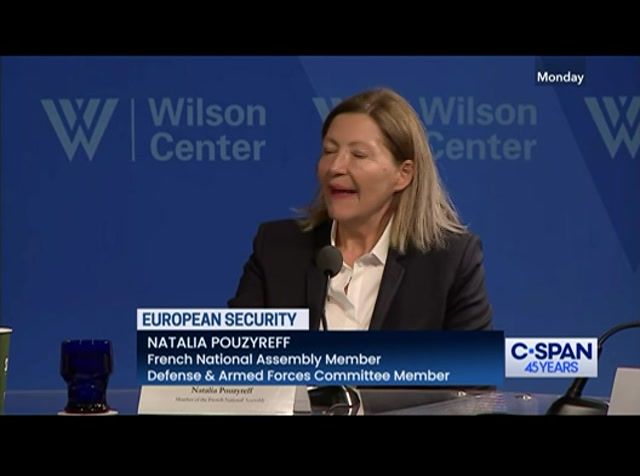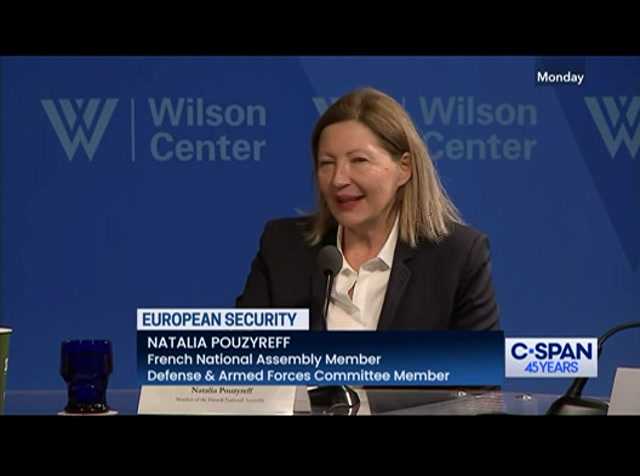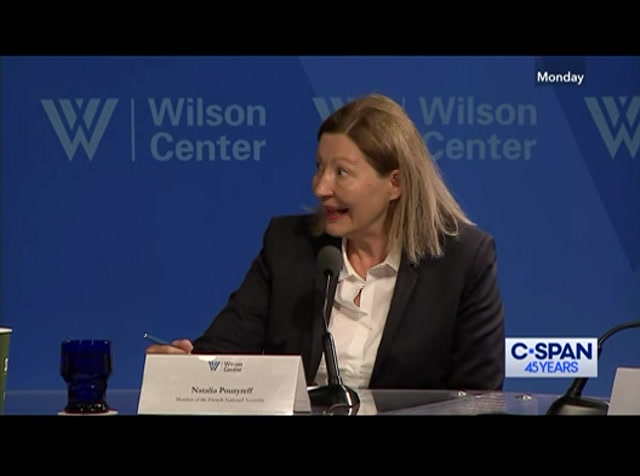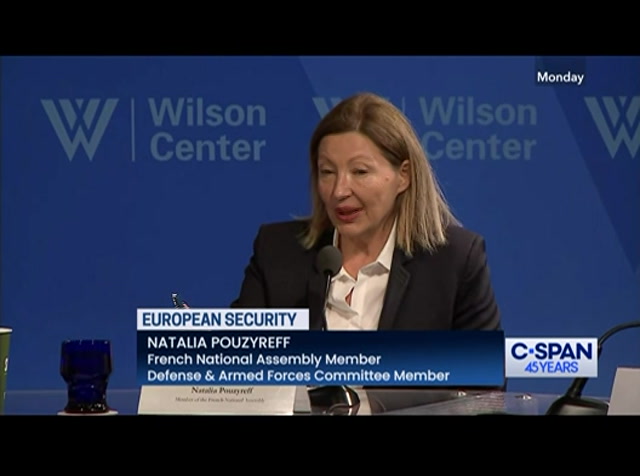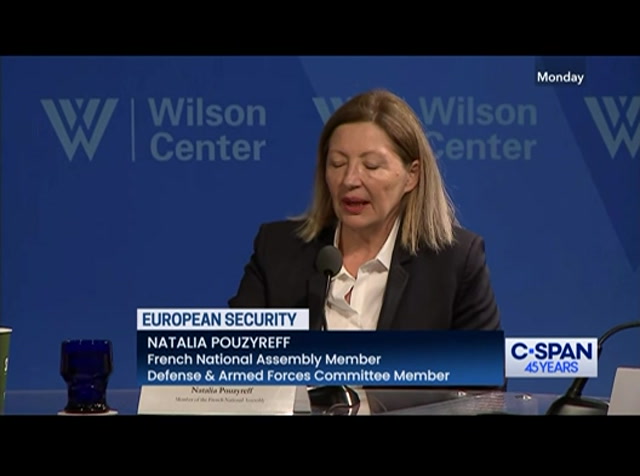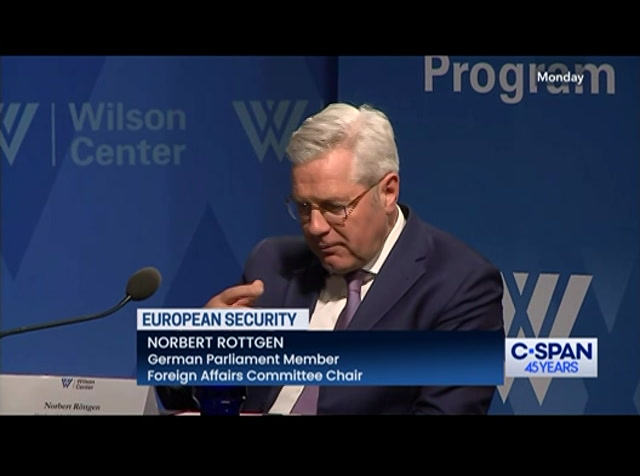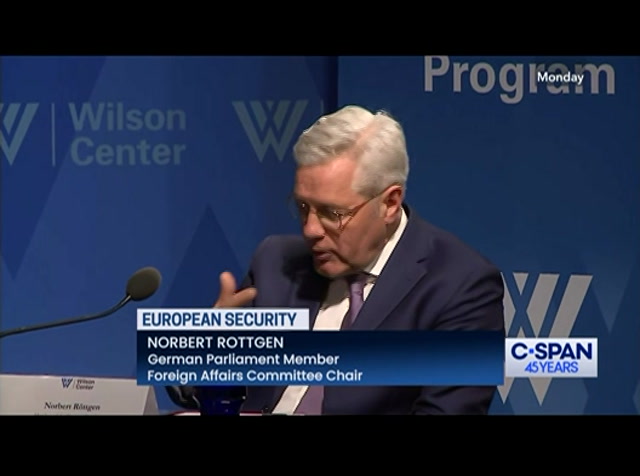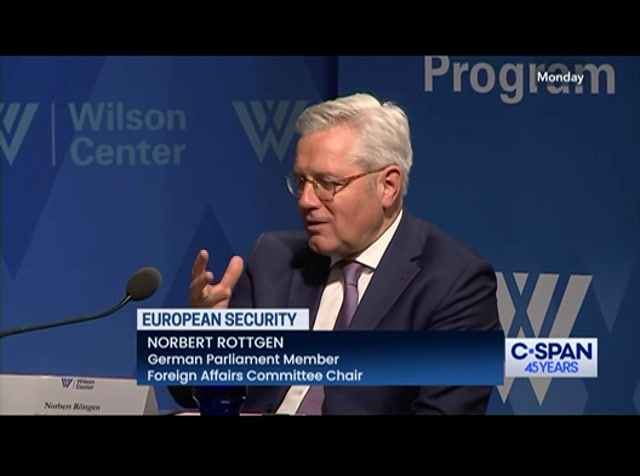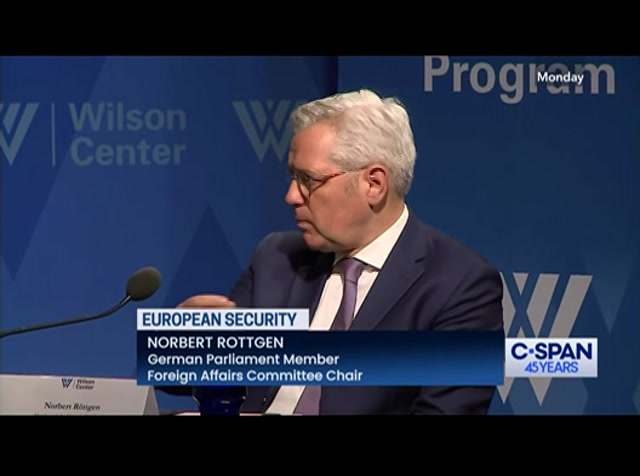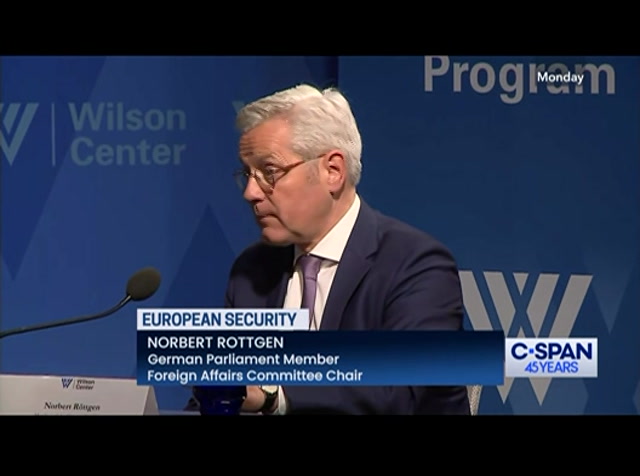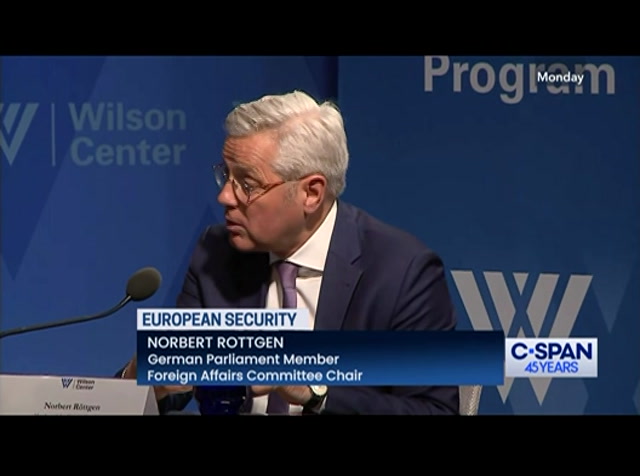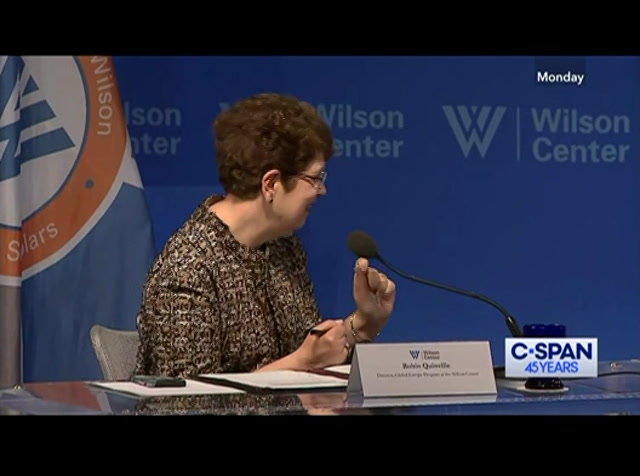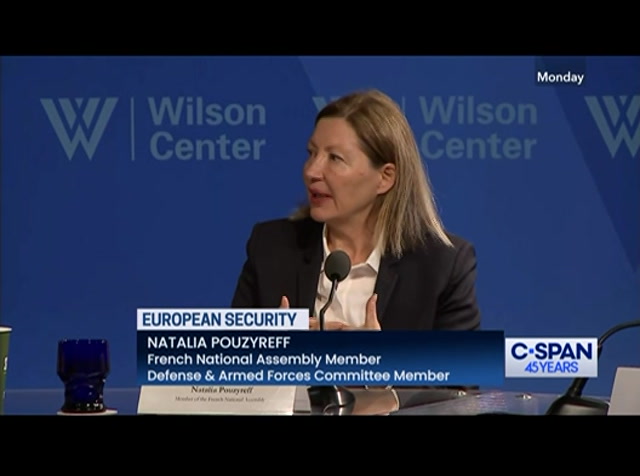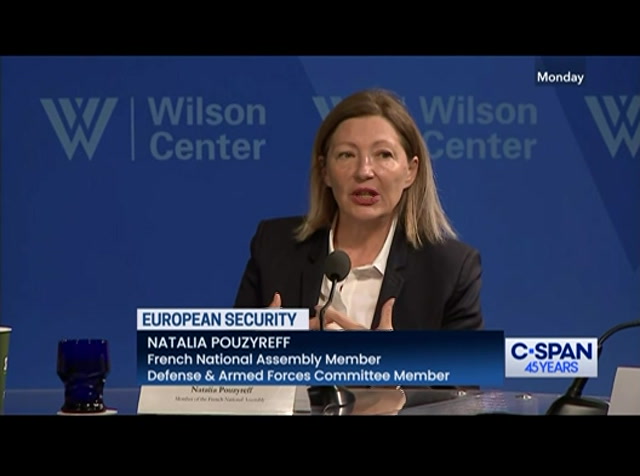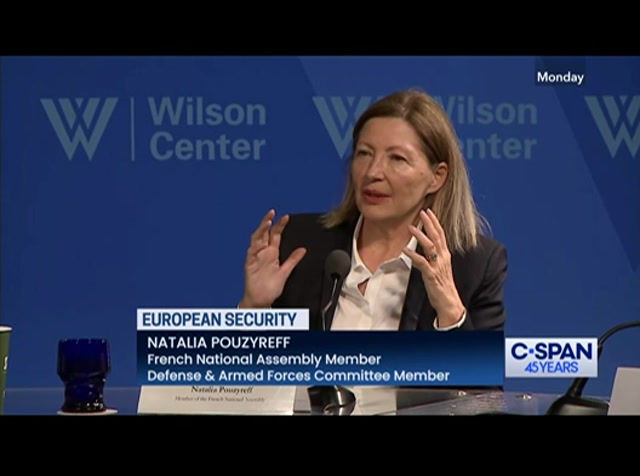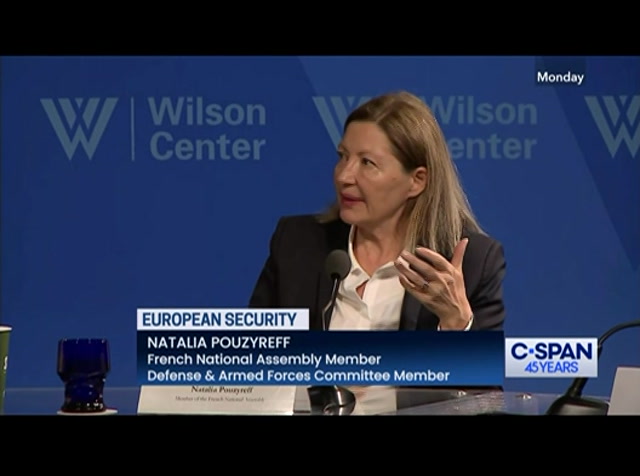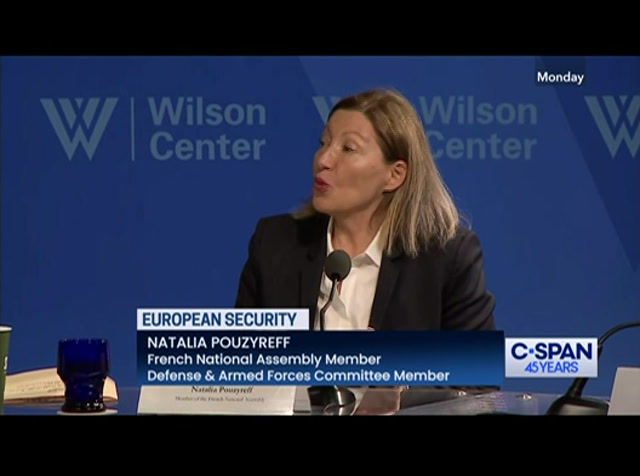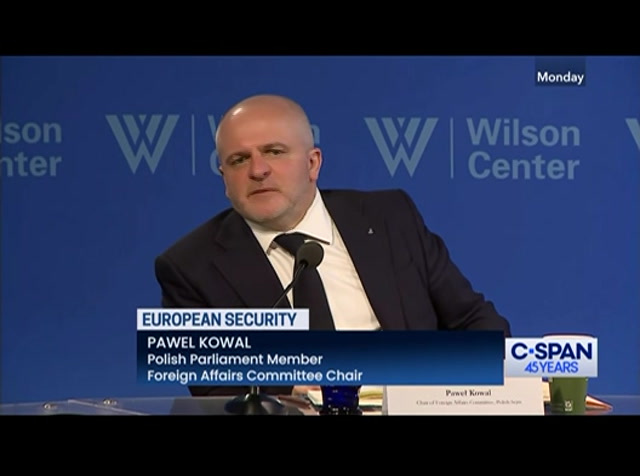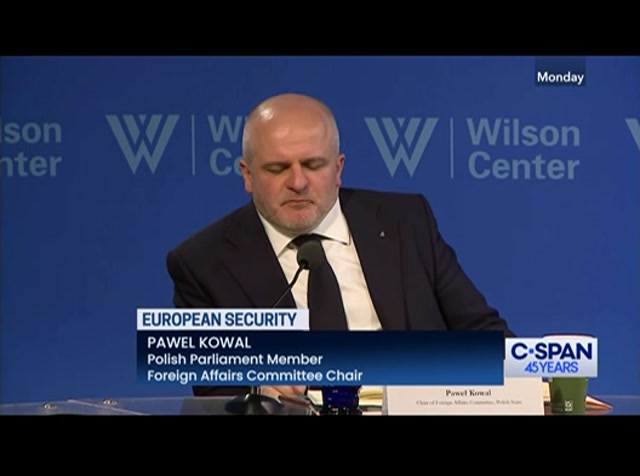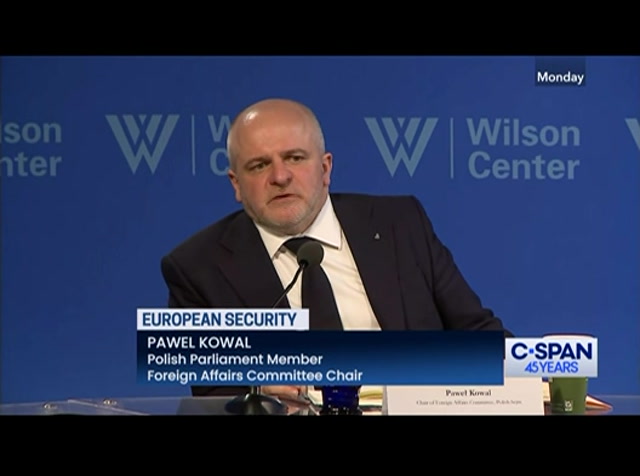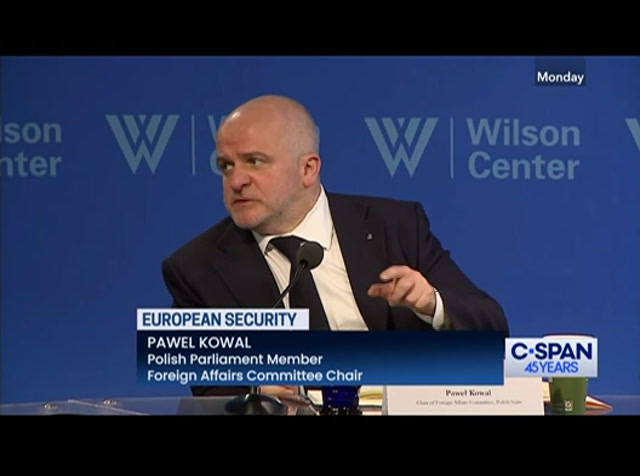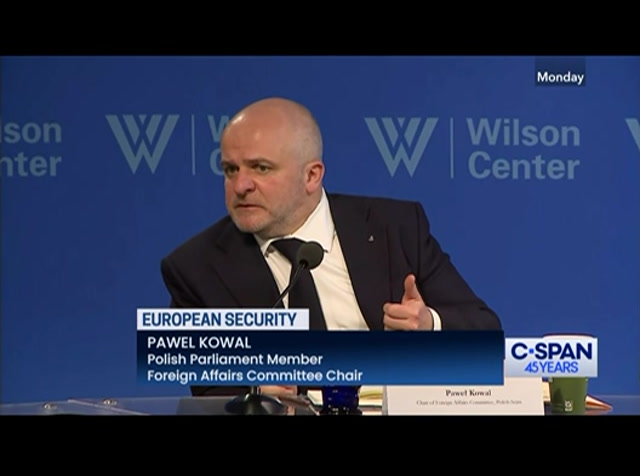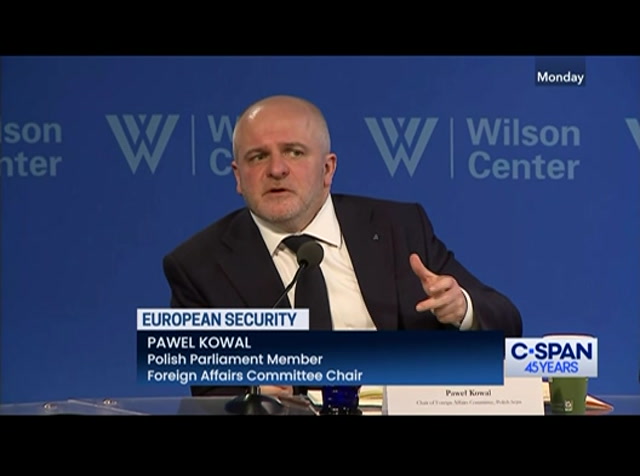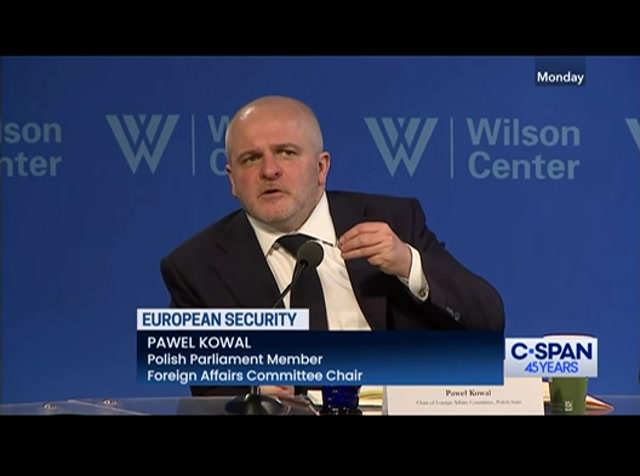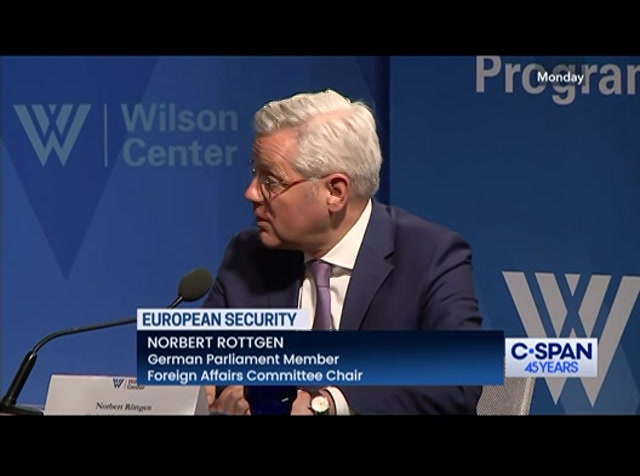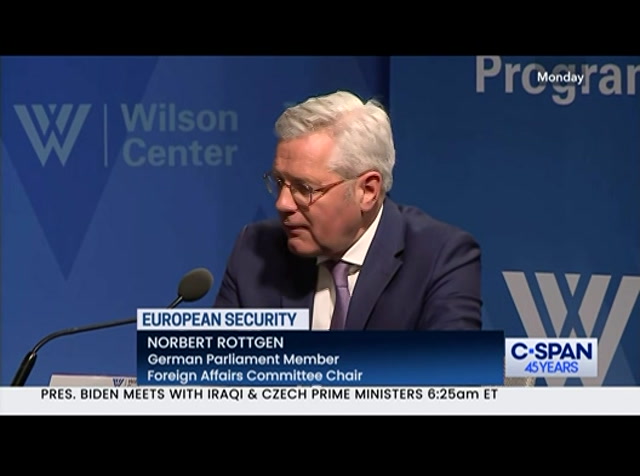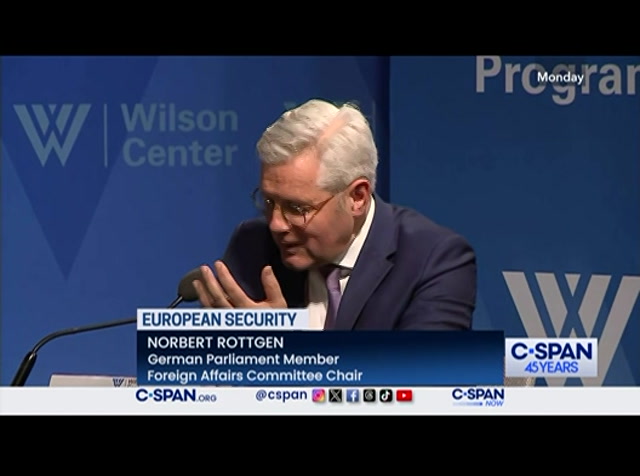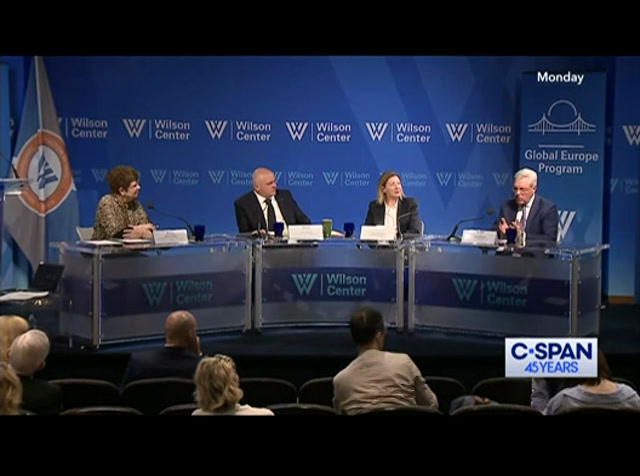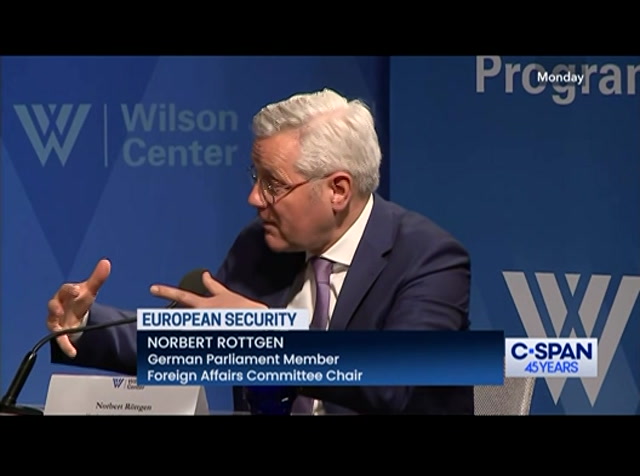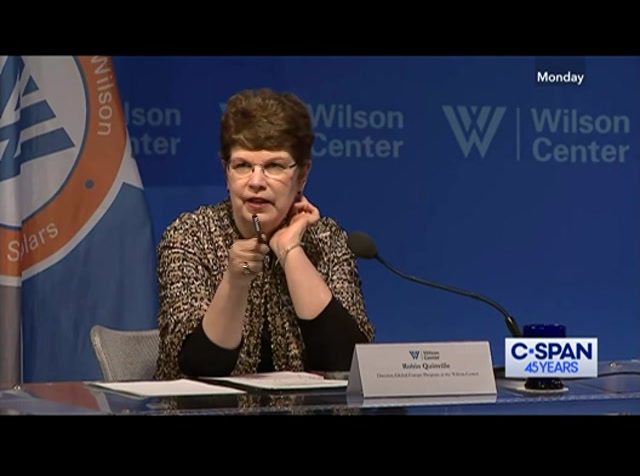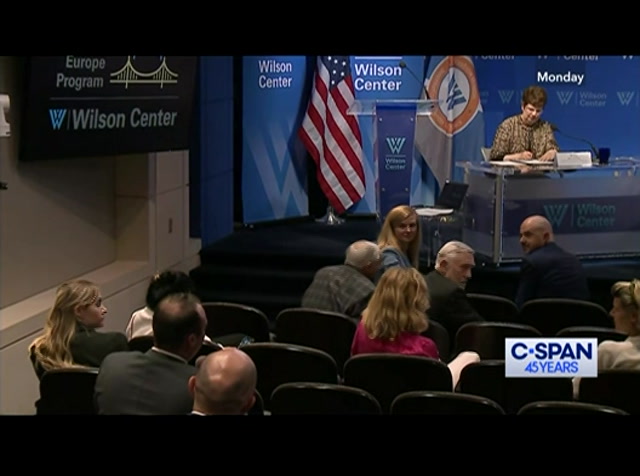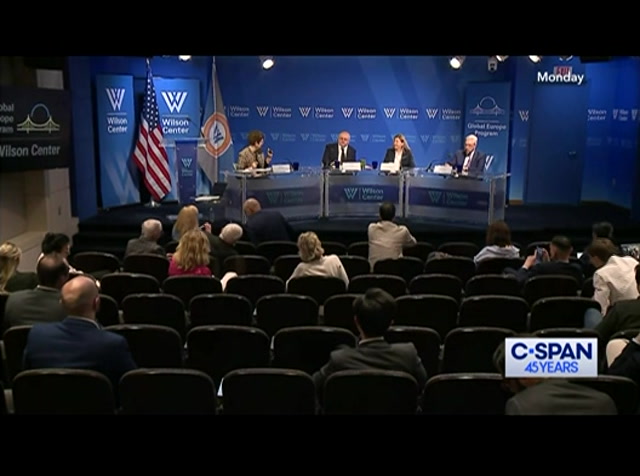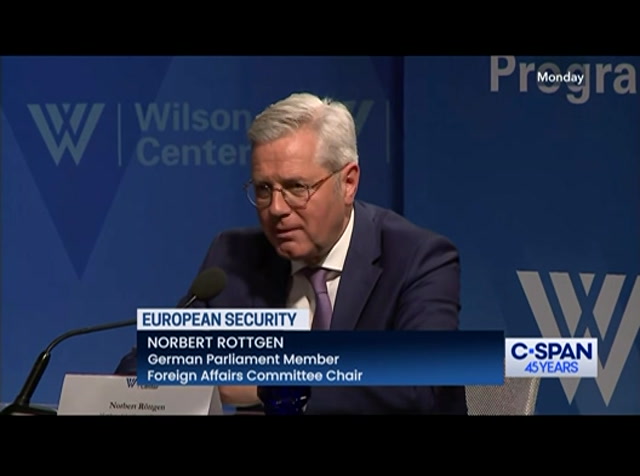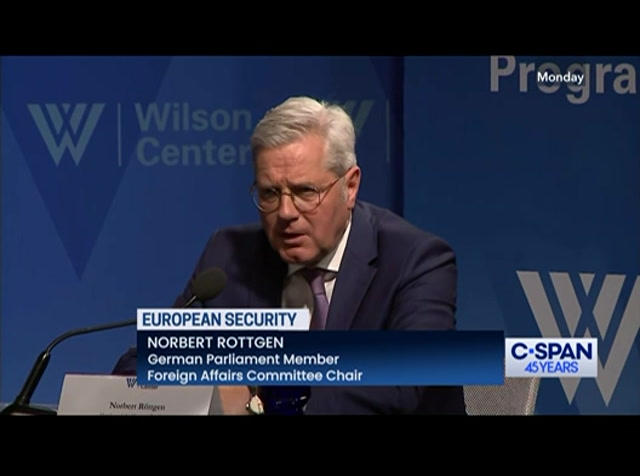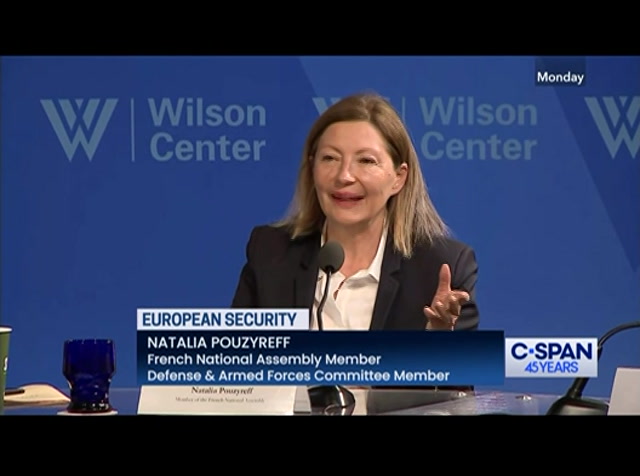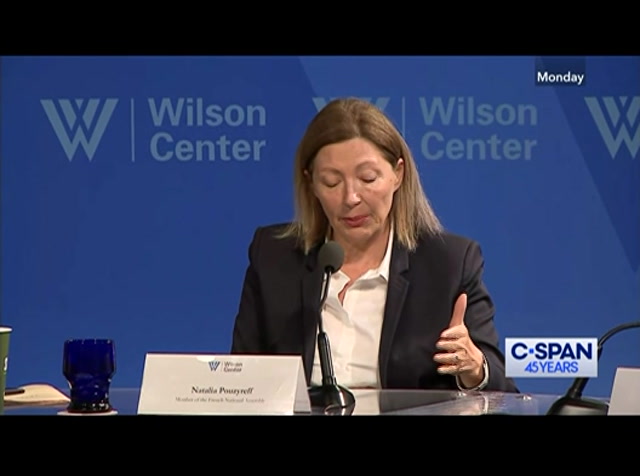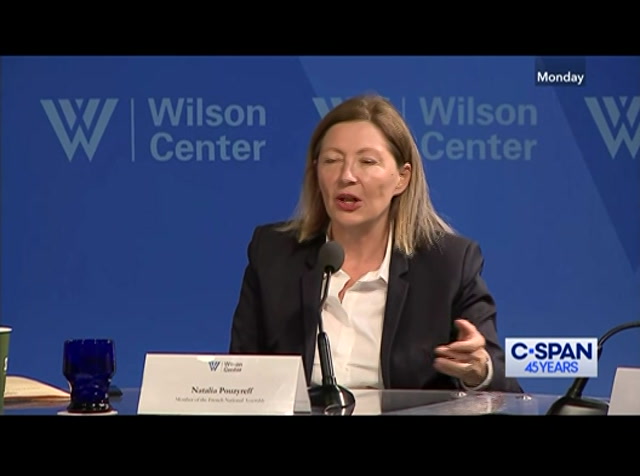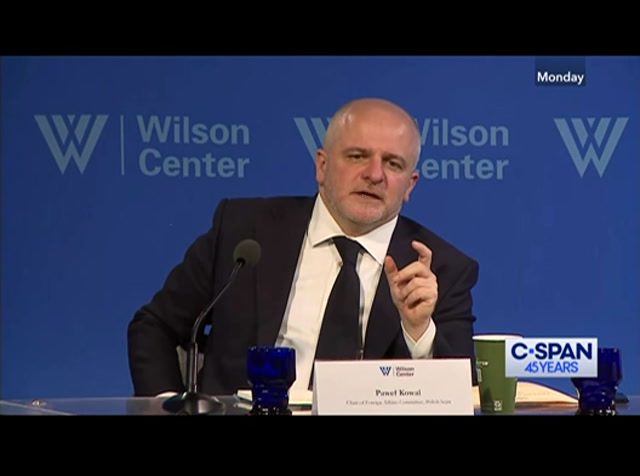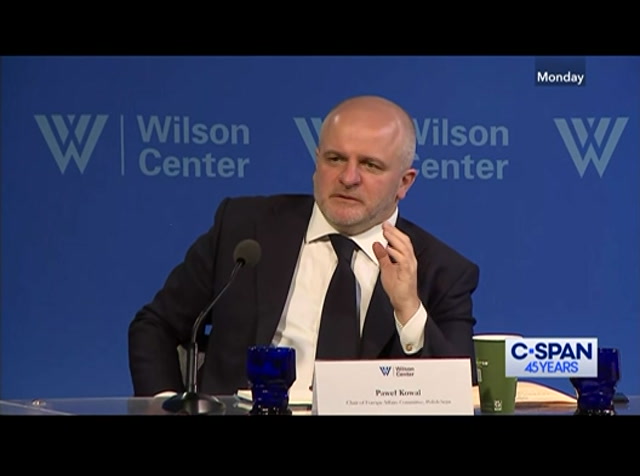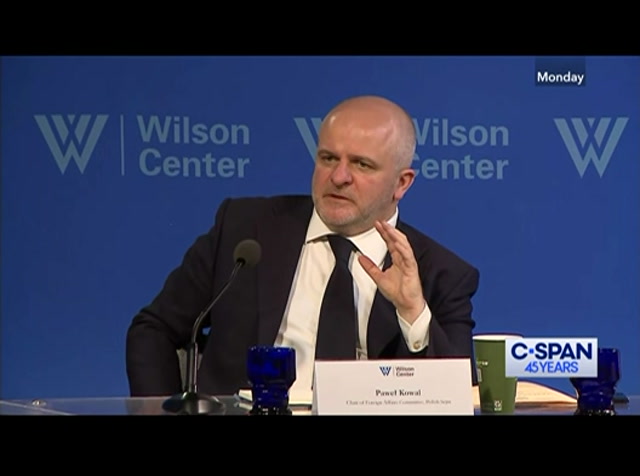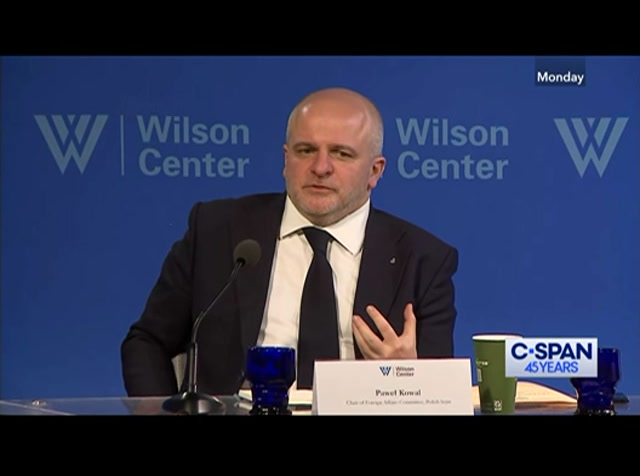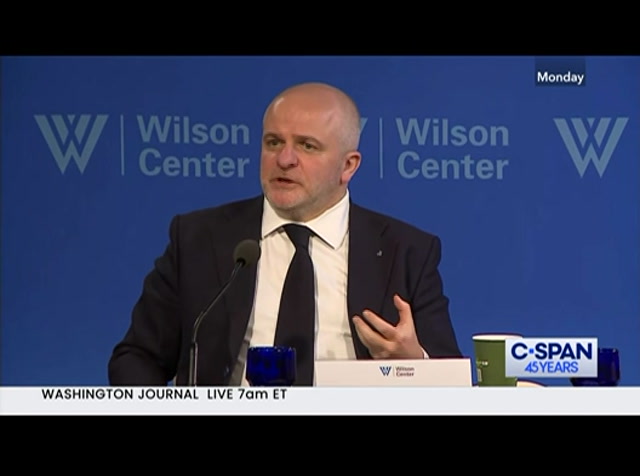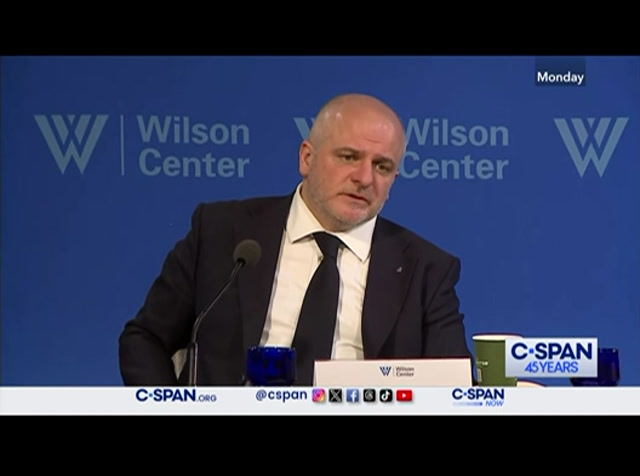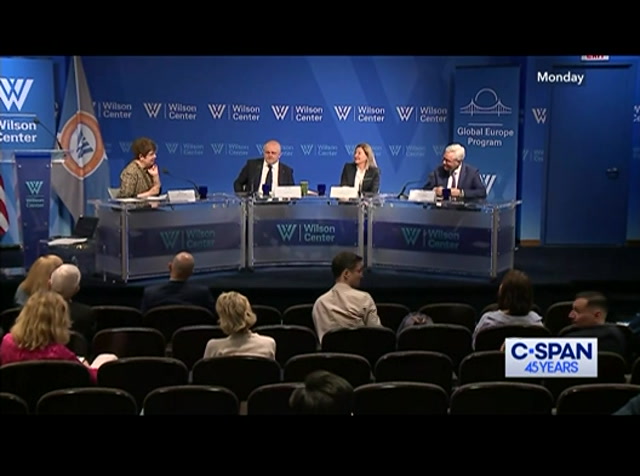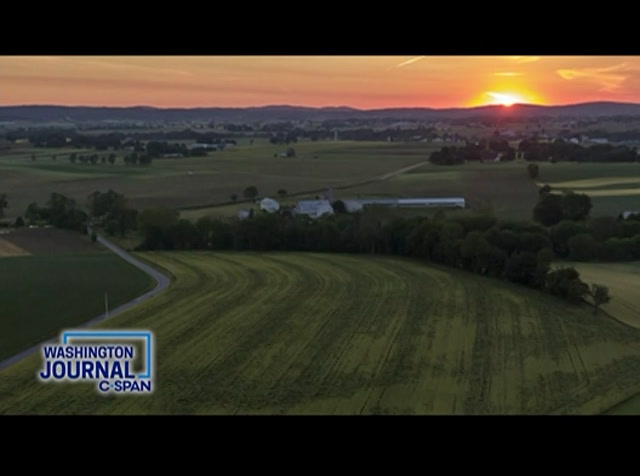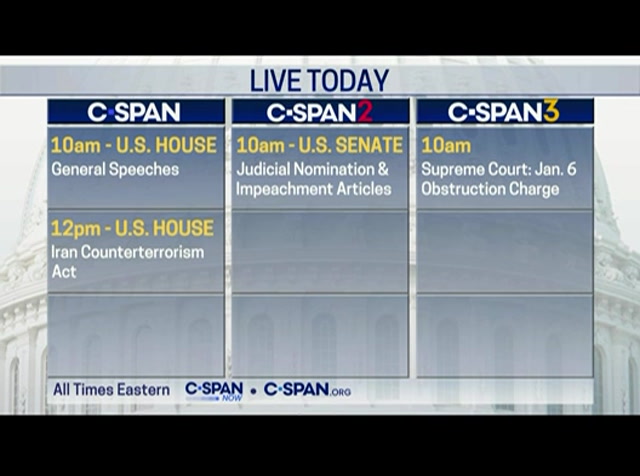tv French German Polish Lawmakers Discuss European Security CSPAN April 16, 2024 4:32am-5:36am EDT
4:32 am
that we are witnessing. >> thank you. we have been told that i have rudely dominated the conversation and we have to bring it to a conclusion. mr. minister, thank you so much has been a time with us today. >> thank you. >> and for giving us your views. we all i think speed is you all asked me question hope afterwards i have the time in private to ask you some questions, words of advice knowing your knowledge and experience in the organization. >> thank you very much. >> thank you. [applause] [inaudible conversations] [inaudible conversations]
4:33 am
4:34 am
and fiercely nonpartisan. i am robin quinville and a director of the global europe program here at the center, and where focus on the challenges europe is facing today and how we work together on those. among these challenges is russia's invasion of ukraine two years ago and the threat it poses to our security as transatlantic partners. as a result of that invasion, nato's membership has grown adding finland and sweden to its strength, and the question of ukraine relationship to nato is going to be front and center at this summer washington summit. the european union has sped forward europeans -- opening negotiations just last month and while that would be a very dependent process, the decision also recognizes and supports ukraine's european future. what we are seeing is a
4:35 am
strategic shift. the invasion of ukraine has shifted europe's threat perception arguably europe's center of gravity. and this is give an immediate impetus to the weimar triangle, france, germany and poland working co-op really together on issues of concern. and so in fact, while cooperation between france and germany has often been seen as the motor powering european union decision-making, the weimar triangle made will be the new, can they call it hybrid, engine of the future? we are exceptionally fortunate to have with us today three prominent members of parliament from these three countries. i'm going to introduce them in alphabetical order so that no diplomatic incidents. first pawel kowal is a share of foreign affairs committee,, professor, cofounder of the museum of the warsaw uprising, and third in polls from
4:36 am
200-55-2000 and before returning into 2019. he also served in polish village of foreign affairs and its ashes could to counsel council. from 2009-14 he was a of the european parliament at its foreign affairs committee. natalia pouzyreff is a member france national assembly answers on the committee of the defense of the armed forces. she has been a member of the national assembly since 2017 and is also been a member of the french delegation to the franco-german parliamentary assembly since 2022. norbert rottgen has been a member of the parliament since 1994 and chaired its foreign affairs committee from 2014-2021. from 2009-12 he was. from 2009-12 he was germany's minister for environmental nature conservation and nuclear safety. and i will just say that while i was dcm at her embassy in berlin, i very much appreciated his engagement and support for the transatlantic.
4:37 am
professor katarzyna pisarska is chairwoman of the casimir pulanski foundation council and chair of the warsaw security forum and i was able to produce with the shipper are impressive list of accomplishments includes professorships at the warsaw school of economics, as well as secure in the u.s. affiliation with university southern california johns hopkins university and harvard university. so it's no wonder she was talent spotters reported by the world economic economics you to come as a in the foreign and security policy. so with all that you know who is up here, and i'm going to tell you this is going to go. so that you any ideas can be thinking of your question because i'm going to try and leave some time for those at the end. so i'm going to ask the doctor come up and give the a coupe remarks and then will have a discussion among ourselves and the ask a few questions, then i'm going to turn to you so this discussion will be as good as
4:38 am
you make it as well. we've got until about 3:00. adam want to thank our colleagues at c-span for agreeing to broadcast this so for those in the audience come we are live on c-span. all right. thank you. >> thank you. thank you very much, robin. thank you goes to the woodrow wilson center for hosting us today. it's been a truly exemplary cooperation we have been having, thank you for your support of this visit. you probably wondered why are we here? and let me start with what i think critical information. never in history have there been a polish, french, german parliamentary delegation to congress. never have our security interests aligned to the extent that we would be speaking in one voice and going to convince the u.s. congress to the very critical security interest of
4:39 am
the entire transatlantic alliance. we have come a as a weimar triangle delegation come first and foremost of course meet congress, meet senators but also do everything for the committee on come subcommittee on your tomorrow to speak about the necessity of the united states remaining in your come remaining at key transatlantic partner. we will also speak mainly about ukraine who today is not being wheeled but is being out shop does everyday because of the lack of antimissile defense shields because of a lack of ammunition come because of the lack of proper arms delivery the country suffers, sipping casually and military casualties. but we also want to bring a message to the congress that europe is stepping up. it is stepping up as an alliance. it is stepping up as individual countries. it is stepping up as a european
4:40 am
union in the area of military support for ukraine but mainly and also in the area of building strong european defense capabilities as part of nato. today already 50% of all assistance to ukraine from european countries. it is not on the military assistance that we are providing. it is the refugees that we are hosting in european countries, millions and millions of ukrainians live and work and had all the benefits of being the danger. we provide humanitarian assistance and, of course, countries such as my own, poland, are critical to military and humanitarian hub for ukraine. and we want to do our share. we understand that european security is at stake. we understand that we are in the shift in european security architecture, and we know your will have two new long-term be able to defend its own continent.
4:41 am
we cannot go alone. the fact that we're setting up does not mean that we do not believe the united states any longer. if we would waver now, if we were to disconnect, if we will, if we will simply abandon ukraine, the consequence would be dire not only for ukraine itself but for the international european security order, including the security of countries closest to russia such as the baltic states and against my own country, poland. so today our discussion with the wonderful three parliamentarians that have come here is of course about what kind of impact the weimar triangle, the reduced hopefully engine of cooperation can have in the area of support for ukraine. but we also want to show a truly voice of unity. if the poles, the french and chairman's come together, i think it means that the situation is getting really
4:42 am
serious. so robin, back to you. >> thank you. thank you so very much. i i think that that really lays out some of the challenges ahead of us. and just for this audience and for our viewers, the weimar triangle was established originally in 1991, but it seems to me that it has always been energized by issues related to ukraine. for example, in 2014 when we had the referendum on crimea, again, the weimar triangle ministers sprang into action, right? just ahead of the invasion in 2022 i believe you are, in fact, a member of the delegation that went to kyiv to show support. so it strikes me that this has proven a catalyst for the weimar triangle work overtime. can you talk levit about the measures you have taken to support ukraine?
4:43 am
katarzyna told us very quickly but what europe is doing but in your countries how you are perceiving this together am going to start with you. >> thank you. thank you so much. practically only few .2 discussion. i would like to propose to you to start from that sentence that, in fact, we can observe the end of central europe, especially of poland. 30 years without work in a great conditions to develop to change europe without war, without conflicts, without problems. and after 2014, after start of
4:44 am
russian invasion against ukraine, we didn't, we didn't see that change our mentality. we also thought that we are, we live in a peaceful work, especially in central europe. and last attack him last russian attack against ukraine fundamentally changed our approach to situation in europe, and the second point is that wartime, because we, in fact, should, we, in fact, live in wartime. we should be ready for completely different style of lives. we should be ready for completely new problems.
4:45 am
we should have much more money for defense, for security. and we are at the moment kind of front of stage after your period and the third point, it's not about, the problem is not about the new role of weimar triangle. from my point of view, weimar triangle is also come has also one role in this historical moment, to re-energize processes in europe. the first one to start to think of our role intensified system of security. the second one, to think our role in enlargement of the
4:46 am
4:49 am
4:50 am
wake-up call for europe. and that europe has been released united since constable united in support of ukraine. we had this european summit intersite in 2022 in march just one month after where european union decided put more effort in military and resided for the sanctions as well. then i would say some species and declaration that were made that we should have at a certain point the western part of of your. we should have listened more to the eastern flank of europe listen more to our polish friend
4:51 am
and belgic friends that the threat was real and considerable. we come to now where the why mark format is really, the weimar triangle is really revived and this is a .2 years after where what we have d say a strategy where we're more aligned on our perspectives. so they become the strategy it, of course but i would say -- first is yes, we have to be more self-reliant, doesn't mean went to be fully independent but we have to boost our capacities for sure, and this is an objective shared by all the member state countries. that's why everyone is investing more and more in this. france has been investing, we
4:52 am
plan to double our defense expenditure during the ten, the use of president macron. we started in 2017. so we will reach i will say minimum but the other countries are now investing more. and so we can be, we say we have to do more for our up defense capabilities. and the second pillar is the transatlantic link from what we call the european pillar within nato. and so we don't see it as something that you could oppose between the strategic economic economy in one side and the european pillar within nato. it's really commentary and it's needed, so we need the united states support within nato. editing the u.s. need also
4:53 am
europe. because europe is fighting for its values, for some ideas, democrat again an ideology that is coming from russia. but that would harm also the united states as a leader on the global scene. so i think we have this common interest. and, of course, now we have more common strategy. we are aligned. we have this what we're doing in the weimar triangle is that we are expressing a political will. and that's a key point within europe. we can have expectations as was said but in order to achieve this strategic goals, there's a need for strong political will. and i think now it's understood amongst the three countries.
4:54 am
and that we are going to engage more the order of the state. we know we are at a critical moment. now we have to find more ammunition, more air defense interceptors. we have to supply them to ukraine. we know it's a critical moment but at least we know where we are going in supporting ukraine until they can win against russia. >> thank you. >> that's all for now. >> you will not find the arguing with the proposition that the united states also needs europe, so i'm going to give you the floor on the same question. >> yes. certainly for germany, the return of a land war, europe,
4:55 am
and the end of the longest piece eight in european history has fundamentally changed our country. and to briefly describe what has changed i would like to start not with our policies but with our people. and before the war, the german mentality increasingly was quite pacifist. so the aspect of defense and military did not play a role. it has an always would be defended. if you spend with this after 1990, now we are surrounded by friends, so do we need the old time cold war military, is not in your page. the new age is the european
4:56 am
peace process. this is finally change. and i would say i could not, i could not remember all or depicting any way our history a situation where a change as profoundly, as quickly, including the change of mentality of the people really has taken place as it has, as it is the case as a result of the war coming back to europe. now, we appreciate a majority of german voters, appreciate more defense spending. we had a recent poll that said a majority says we have to be critical in our budget and we do not want to increase that spending but there's one exception, and it is for security and for defense spending. there is a majority arguing for more weapons to ukraine. so unbelievable three years ago
4:57 am
from now if anybody had proposed there could be a situation seeing germany delivering weapons to any kind of conflict, because traditional doctrine of german foreign policy was no weapons to an ongoing conflict. and certainly and particularly not if and when russia is involved in it. so this as a fundamental shift and the famous -- the seachange of policy, the german chancellor announced the bundestag only three days after the war broke out on 27th of february has really taken root in the german come in the majority of the german people and population, and this is really, really, really remarkable. and this is a real hope that this is not only help, this is evidence to the fact that this
4:58 am
is not for the moment but this is a fundamental shift, a paradigm shift, including mentality and policy. in terms of policy, also a lot has happened. we agreed in a bipartisan, with support of opposition, the largest opposition party, not all opposition parties to establish a 100 billion special debt fund to fund our army. we abandoned, i thought for years with many friends in this country with nord stream ii but now was a matter of days which came to was abandoned. >> i remember. >> what? >> i remember. >> you remember, yes, yes. and the defense or the military
4:59 am
support germany has given to ukraine in 22 and 23, amounts to around 12 billion euros. we have now 7 billion euros in our current budget. of course additional help for refugees, 1 million ukrainian refugees, state aid budget help to mentoring aid. so really a lot has been done. however, and i will conclude with that, this is true for germany. it's true for europe. it's true for the west. we are not doing enough. if you compare what we are doing against the past, it's impressive, totally impressive. unimaginable. if you measure it from what is necessary to achieve our goals, and our goal is to defeat war, this is what is at stake. if war turns out to be
5:00 am
successful, even only partially successful, war would remain in europe and this would create different europe from today. you would not recognize his europe if word gets established because then it would extend and would come closer to us. so it's all about our own interests. of course it solidarity for ukraine and all that, but but fundamentally we're talking about our own interests, about our own and what are we doing about that. regarding an related to this, we are insufficient. and we really have to do more. as i said, much has changed, but the real and critical point is are we doing enough for what is at stake? and the simple answer is no, we
5:01 am
are not. and time is running out. time is of the essence and we have to really step up very quickly, otherwise the costs and the consequences would be of a historic dimension negatively for all of them. >> i agree with you. and i think what we see here and we sometimes hear, we see all of these things that it happenen each of your countries in order to support, but you're right, the question loduca of ts really key in all of this. i think sometimes that is a question of how long will this last? we have seen now what 18 to 20 countries of the nato allies have managed to reach the 2% i will do so this year. but what i'm wondering is whether or not this configuration the weimar triangle, can it be a way of ensuring that this continues
5:02 am
throughout europe, that you only get this, can you be persuasive the entrepôt populations across europe? and how do you see that going in the future? and maybe i'll ask is with you, madame, dissonance it just since political owes something you identified as critical. >> yes. yes, i said the political will buy the weimar triangle has kept -- to engage the other member states. for instance, sweden and finland joined nato and the great expectations, what they could say how we could cooperate, coordinate better within the transatlantic areas and within the eu. so we have to provide answers to all of the countries. you asked me about the population as well. this is a difficult role, part
5:03 am
of the parliamentarians. we need to maintain public support. that's not that easy because what's maybe the americans do not know is the war has taken a toll on the european cities, too. because of the increase in prices, the increase in the food prices, the inflation. so each time you have, you know, you see your living costs, you know, increasing, then that there's a to react, yes, we should take more about our own living conditions, you know? so this is very important to keep the momentum amongst our population. this is for sure, to show that
5:04 am
if there's no stability in europe there will be no prosperity. and to think there will be less prosperity and use as well in fact, because all our economies are linked. but for sure we have to keep them very much informed. at the moment it's crucial so we have to make the population understand there's a need for, you know, to react together for what's increasing our collective defense. and this includes also the cities of the countries. this is very important to have them on board. and i think that because we are frightened as well by russia, this is what makes the people react, i i was at the casual t also other levels. when you have a cyber attack that that is lodged by russia on a
5:05 am
hospital where all the systems are broken and you cannot go and have your treatment, when you fear that there is maybe some interference with the european next european elections, when you see every day the formation propaganda spread on the social network in an attempt to destabilize really our country's, so that people tend to react to that and moreover, i would say that we have seen acts of aggression on our territories in europe. there was this russian pilot deserter who was killed, who was eliminated in spain. there was i would say the assistant of -- was bitten in
5:06 am
lithuania. there is a prime minister of estonia who is under kind of mandate from the russian state. what is happening in europe. we feel threatens of the people can feel that there's a need of, you know, we need you, i would say not to react but to get prepared to whatever could happen in europe. >> so i think your country has felt this perhaps first among europe. the use of the countries that actually are also as committed to this? do you feel this across europe populations recognize this threat? >> i would like come first i would like to underline that
5:07 am
extraordinary role of population of polish people the first week to russia attack against ukraine in 2022. it was huge popularization kind of humanitarian uprising on full-scale. practically every polish family supported -- supported ukrainian families, children, et cetera. and today i think that it's clear that fear of war is back to europe. in fact, and the mobilization which is from one side really optimistic. it and also other side, another
5:08 am
side, it is fear. there is very thin border between mobilization and spreading that war fear in europe. it's a question of consistency between our declaration and real action. and there was, in fact, firstly, there was, in fact, in my opinion purely psychological problem. to take effectively responsibility for the security of europe, the first time from the end of that first world war. we vowed to end, but not against europe. because this is a question of
5:09 am
new interpretation. we should be real partner. and i think that we have, in fact, three perspective. the first perspective, really it's a question of action of the current situation on the frontline. in my second half of the polish -- polish ukraine, i visited practically every month ukraine but not only kyiv the last time i visited trenches closest to the front. so real. and i'm sure that the first question is action of the current situation. and the paradox that i
5:10 am
understood during the launch in paris that all saw, my heart understood that showed problems on the frontline today. it's not only problems, not only problem in the military. it's also a problem for politics in ukraine, the power of zelensky. and it's a problem for the legitimization of our polish, are pro-international law policy last two years. you can imagine, we can imagine the results of the potential
5:11 am
breaking of the frontlines in this year. for all democratic come for all ukrainian governments and forces. and this is the real situation today. if i say that we live in wartime, i mean not only military question. also against poland, not only against poland. also against baltic states, cyber attacks, energy wars. this is a real situation in europe. and because we should and our task as a politician, it's during the forthcoming months to deliver ammunition.
5:12 am
i am personally assure -- that soldiers on the front line really need ammunition. the second one, to re-energize production of ammunition and another military equipment in europe. and the first step, strategic step, to have idea of new shape of security in the west. how we should do in the future between u.s. and canada and european union. how we should set new duties and
5:13 am
durations in future after the war. from my point of view, this is my last point, it's an element of interest by country. it's to be ready for enlargement. because we should deliver to ukraine not only ammunition. we should deliver also hope that ukrainians but also georgians and mold off the ends that mold- have their place in democratic world. it's not only about ammunition. it's the first condition, and we should also start discussion about strategy questions, and strategy questions is new order
5:14 am
in the future. >> okay. with that i'm going to give the floor to -- because we come to the question of changing strategic view and taking more responsibility, i think many people look to germany and say are you ready? >> absolutely. this is, and this is a crucial question, i absolutely agree on that. i would say in any way this war has already produced a new and different europe, and it will further change europe. but however we're not only the object of changes which are imposed from outside to us, but we also, we can become actors in the emergence, the process of emergence of a new european architecture, political order of the security architecture. and i would say there is this
5:15 am
war, as horrible as it is, it has produced a european moment. and now it is upon politicians, and i would say unavoidably upon germany, to be ready to seize the european moment that is there. it's not from the perspective of an opposition politician, which i am a that is now in opposition. unfortunately, i had to set the german chancellor so far has not seized this moment. the european moment that has been created and is still there is to bring about, to give birth to a new dimension of the european union that so far is mainly an integral european integrated entity. we had some internal market.
5:16 am
and what this, and this work constitutes a situation that europe comes to the decision to become an actor in its own security affairs. we have to live up to this new dimension of a a europe that s stable and contributing to its own security. this will become a necessity for europe anyway. this can become a necessary at the end of this year. if the elections have different outcome and not a shock outcome for european security, it will, over time. because we will not see the return of a transatlantic consensus that the united states sees itself responsible to
5:17 am
provide, to provide for european security. it will in any way become a european affair. and we have to shape this process and we have to come this is already underway. it was already mentioned that we have two new european nato members. so the northern grouping of europe, of the european union has already changed, is changing within this aspect and efficient in it. and i knew europe that is working to shape a new european order. of course cannot by definition be a western and southern europe. it has to comprise east, the city, the west, the south and the north. and in this respect, to bring together poland as the represented a leading country of the central and eastern european countries.
5:18 am
and france as a representative of the western and southern countries. and with the germany in the center of this bridging east and west, this i think has to be the motivation and the key to starting to develop to emerge and do europe that is able to recognize and appreciate that this war puts at stake the fate of our own europe, and that we have to come together, close ranks, bring up resources, capabilities and political will to provide for our own future. and so the emergence of a new europe responding to the new security situation constituted by an imperialist and warmongering russia which will remain for some time, something
5:19 am
which, which is a a part of te potential to positively shape the response to this war. >> thank you. so i promise you a couple of minutes of questions. i'm going to take a couple of those. please wait for the microphone. and here's why. otherwise they will not hear you on our transmission, webcast, okay? so if you want to be heard, that's the thing. diana, i'm going to come to you. your hand was up first. some good to take a couple at a time. maybe i will bundle three at a time, the rico. first diana and then stephanie and then i will take -- >> think you have much for the most informative presentation. the question remains why only three next where is italy? wears holland? wears denmark? why only three of you?
5:20 am
>> i work for german publication. quick question that essay quickly you're going to congress tomorrow together? what what you going to say te who do block the eight? not many people but they are inclined that do anything. how are you going to convince them? >> will try to take another round of classes were thank you all for being here. my question relates to the eight this been blocked and congress obviously with the united states not being as reliable of apartment and her sector of the army last week voice concern of russian breakthrough if we can't get munitions and supplies over to ukraine immediately. i know some countries have it the 2% gdp mark. others have not. the question of europe's
5:21 am
military readiness is still an issue. if ukraine is to fall, is a europe ready today, tomorrow to take on a russian power without the support of the united states? i guess what are policies being done to prepare europe tomorrow and not by 2028? >> okay. i'm going to give each of you the floor. you can choose of those questions which one or more you want to answer. i think i will start and work my way this way. >> why only three? the alternative and you outline delta would be 27. so we have a representative role i would assume, and this is as it said it is east center, the west and south, and germany is inevitable peace in the center
5:22 am
of it. i think it represents an away europe comprising east and western. this is a symbol would want to deliver. what are the main arguments? of course there are a lot of arguments. i would argue, they better congress. i would argue very fundamentally from the concept of common interest. it's an american interest that europe is safe and strong it's an american interest that putin does not win. for europe and because it would be the victory also of others. also of iran in so there's an international context in that. and american should be a part of the success that is unfolding and unfolding in the change of europe as we tried to describe here. there is a fundamental change and this is mainly due as a
5:23 am
result of the transatlantic community and american support. so stay in europe even now when we are adapting to the security necessities. if you, last question and very briefly, if ukraine falls, what would happen then? i think this is the argument. they are also fighting for our interests. and the smartest utilitarian egotistic think we should do in her own interest is to prevent this to happen because then why would come closer to us. >> yes. i would say to add to what norbert said, what we would tell to the congressman, in the next
5:24 am
nato summit what will think about the future of the transatlantic allies? it links to what you said. what but we think u.s. is ave parker? what is the signal that will be demonstrated, shown to the rest of the world? but you're right to question the european military readiness. first those countries, goes country by country. if i take france, we have an operational army but up to now we have, we were more targeting say expeditionary conflicts like
14 Views
IN COLLECTIONS
CSPAN Television Archive
Television Archive  Television Archive News Search Service
Television Archive News Search Service 
Uploaded by TV Archive on

 Live Music Archive
Live Music Archive Librivox Free Audio
Librivox Free Audio Metropolitan Museum
Metropolitan Museum Cleveland Museum of Art
Cleveland Museum of Art Internet Arcade
Internet Arcade Console Living Room
Console Living Room Books to Borrow
Books to Borrow Open Library
Open Library TV News
TV News Understanding 9/11
Understanding 9/11